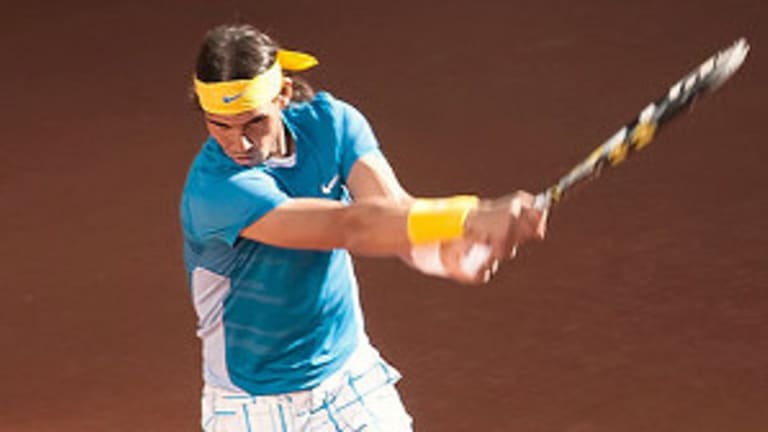Around this time last year, my friend and colleague at TENNIS.com, Pete Bodo, wrote an article entitled “Rafatigue.” Its theme, in case you can’t guess, was about how dully predictable it can be to spend a large part of every spring watching Rafael Nadal win match after match and tournament after tournament on clay.
The sentiment isn’t hard to understand. No tennis player has ever turned an entire stretch of a season into his own personal playground the way Nadal has. Over the last decade, Rafa's record during the clay swing is 216-8, and he’s won 36 of the 44 tournaments he’s played. Going strictly by the numbers, when Rafa enters an event in spring, the suspense exits.
Yet I tend to see his presence at this time of year the opposite way. Because Nadal is such a heavy favorite every time he takes the court on dirt, it means that even the slightest slip-up or sign of nerves from him, or the briefest run of nothing-to-lose good play from his opponent, can turn his matches into must-watch tennis—until he eventually finds his range and drops the hammer again. The fact that Nadal wins so much on clay makes even the slightest possibility that he’ll lose that much more momentous.
On Sunday, I thought about Nadal during this time of year as I tuned into the end of the Masters. I usually watch a good chunk of golf's first major; this time, though, I wasn’t able to muster up much interest until the 65th hole or so. The reason wouldn’t have surprised a TV programmer, but it did surprise me a little: Tiger Woods wasn’t in the tournament.
I’m not a Tiger fan; in fact, I’ve almost never rooted for him. This has something to do with my natural preference for the underdog, though that doesn’t explain all of my rooting choices—in the 1990s, I was happy to watch Michael Jordan win everything. But from the start there was something about Woods’ air of invincibility that rubbed me the wrong way as I watched him stride down a fairway, and his early, Nike-sponsored image as a golf messiah only made me want to see him taken down a notch. (Again, this isn’t always the case: While LeBron James was hyped with similar thoroughness as a kid, it never bothered me, and I’ve always rooted for him.) Every two years, I do get the chance to go over to Tiger’s side for one weekend, when he plays for the U.S. in Ryder Cup. I’ve always found it strange how how much more likable—human, vulnerable—he suddenly seems to me in the team context.
But that isn’t how I’ve seen Woods at the Masters. Following the tournament on TV or in the papers, I typically kept one eye on the leaders’ scores, and one eye on Woods’s score. For a decade, of course, he was the leader; over his last five, Slam-less years, though, Tiger has tended to stay within striking distance for 54 holes, before fading on Sunday. But even when he isn’t challenging for the title, his presence alone at a major adds an edge to the tournament and raises the historical stakes—other guys can win, obviously, but only Tiger is within striking distance of Jack Nicklaus’s all-time Grand Slam record. I don’t think I’m the only casual golf fan who watches this way, and I don’t think I’m the only one who found this year’s Masters difficult to care about after he underwent back surgery.
“I’ll admit, I miss him,” USA Today sports columnist Christine Brennan, never known as a Woods fan, conceded last week. “I miss Tiger Woods. I wish he were here. Love him or loathe him, he makes golf tournaments so much more interesting.”
Apparently, the viewing public agreed. ESPN’s broadcast of Thursday's opening round was down nearly 25 percent from 2013, and earned its lowest rating since the network began broadcasting the Masters seven years ago.
Among tennis players, Woods has been most closely linked to his fellow Slam king Roger Federer. But Nadal, while he has never projected a Tiger-like air of invincibility, considers the golfer one of his athletic role models, for his excellence and dedication to a sport whose frustrations Rafa the recreational duffer understands. Nadal also understands that appearances can be deceiving when it comes to dominant athletes. As he has always reminded us, it’s not as easy as it looks, even for the best, and no match is a sure thing.
“I know I’m not going to keep winning all of the tournaments on clay forever,” Nadal said this week, in his customary, almost superstitiously, fatalistic way. “And there is going to arrive a day when I’m not going to win one more. But hopefully not yet.”
